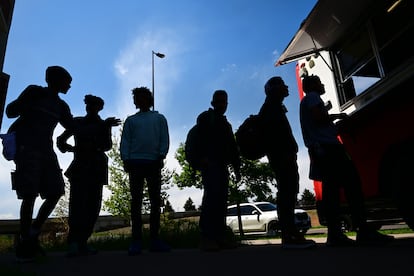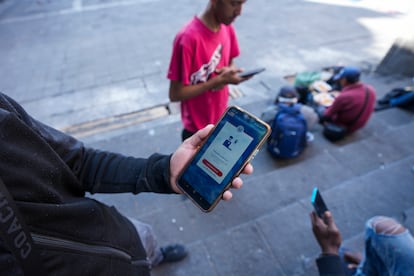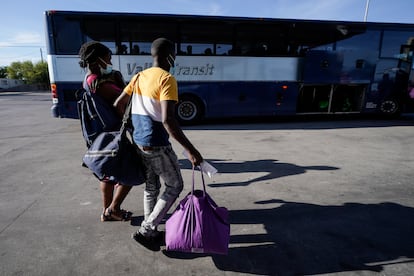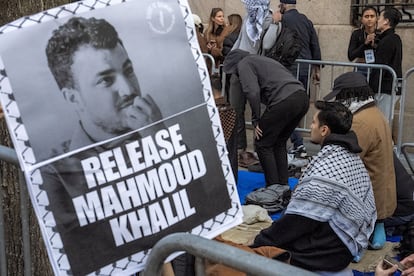Trump’s immigration paradox: Cracking down on undocumented migrants, while increasing the number of them
The revocation of visas and temporary residency programs has taken legal status away from more than two million people


The undocumented population in the United States ranges between 11 and 13 million people, depending on the source. However, the elimination of legal pathways that existed until now could add more than two million people to this number.
It’s paradoxical that a government that has set itself the goal of expelling all undocumented migrants from the country is busy expanding its deportation list, pushing those with legal status into the shadows.
“By canceling these programs, what they’re doing is increasing the number of undocumented immigrants in this country. And, not only that: they’re pushing them further into the shadows. They’re pushing them further into illegality with these policies that seek to instill fear and panic among the immigrant community,” explains Vanessa Cárdenas, president of America’s Voice, a pro-immigrant non-profit association.
An undocumented person is someone who lacks papers that allow them to reside legally in a country. In the United States, undocumented migrants are considered “undocumented” because they entered the country secretly — avoiding an official border crossing — or their visas (work, tourist, or student) have expired, and they haven’t left.
Under the current administration, however, a new type of undocumented immigrant is on the rise: migrants who entered the U.S. legally and were granted temporary status that has now been revoked. This is the case for those who benefited from programs such as Temporary Protected Status (TPS) or humanitarian parole, or those who arrived through the CBP One app, designed to schedule appointments with immigration authorities. Added to these are the hundreds of international students who — despite being enrolled in the country’s universities — have now had their visas revoked.
Fear about who might be next to lose their status has spread among the immigrant community, after seeing how thousands of people lost their right to reside in the country overnight.
The Biden administration approved new programs to stem the growing number of undocumented migrants arriving in the U.S., which sparked an immigration crisis that cost him at the polls. To avoid further overwhelming the already strained border, authorities launched CBP One, an appointment-based app that allowed people to apply for asylum before entering the United States.
However, last week, the temporary protection granted to the 936,500 people who entered through this legal pathway until December 2024 was revoked. Several of them received letters ordering them to immediately leave the country through CBP Home, an app that has replaced CBP One and is supposedly designed for “self-deportation.”

It’s not yet known how many migrants who entered via CBP One already requested another permit before the new policy was implemented. Those who have not done so, however, have been placed directly on the list of undocumented migrants. Therefore, they’re subject to deportation by the current administration.
This is also the case for the 532,000 migrants who have been residing legally in the country thanks to the humanitarian parole program and who — starting April 24 — will be added to the list of those eligible for deportation if they have not secured another form of protection. These individuals are Nicaraguans, Venezuelans, Cubans and Haitians fleeing situations of extreme violence. Biden granted them two-year-long residence permits, provided a U.S.-based sponsor took responsibility for them. It turns out that the dream of starting a better life — safe from the threats in their countries of origin — was short-lived.
“Creating these legal channels is the best way to improve the immigration system. Let people know they don’t have to enter the U.S. with a coyote [human trafficker]. Eliminating all these pathways isn’t the solution” to a problem that migrant advocacy organizations have been warning about for years, Cárdenas warns.
Another half-a-million Haitian citizens have lost the legal status they previously enjoyed. This is because the Trump administration has canceled the TPS program, which granted these individuals work permits for a period of a year-and-a-half.
Designed to receive migrants fleeing armed conflict or crises caused by natural disasters, Biden extended it in March 2021 to receive 600,000 Venezuelans fleeing the growing instability in their country. Two weeks before the end of his term, the Democrat renewed the protection for another 18 months. Subsequently, Trump repealed it to increase his list of potential deportations. In the case of Venezuelans, however, a court ruling has temporarily halted their expulsion.

Targeting the most vulnerable
For Leisy Abrego — a professor in the Department of Mexican, Chicano and Central American Studies at UCLA — the reason the number of undocumented migrants is increasing is to facilitate more deportations, thus keeping Trump’s political base happy.
“Since they have promised that they’re going to remove millions of people and aren’t doing it, they now have to figure out where to go, how to expand the definition of who they can remove, who the most vulnerable people are. And it’s much easier with those with temporary residence permits, because, since they weren’t undocumented, [the government] has the information on where to find them,” she explains.
Among her students — some of whom are undocumented — Abrego sees firsthand how fear has spread through the universities. Even those who arrived with visas are afraid. “International students, for example, don’t have many rights; they’re the first to be attacked.”
Last month, Secretary of State Marco Rubio boasted about having revoked more than 300 visas, most of which were issued to international students. “If they’re taking activities that are counter to our foreign, to our national interest, to our foreign policy, we’ll revoke the visa,” Rubio declared.
“Even naturalized students and those with green cards [which guarantee permanent residency] are afraid, because we’ve seen that these people — without legal reason — are being deprived of their liberty,” Abrego affirms.
The first of these cases to hit the media was that of Mahmoud Khalil, who is being detained in a Louisiana facility for participating in the pro-Palestinian protests at Columbia University.

Visa revocations are now being carried out for minor reasons that previously didn’t result in such a penalty. This has been especially prevalent in the current academic semester. A graduate student at the University of Minnesota — Doğukan Günaydin — was detained by ICE on March 27 while heading to class. This was apparently due to a prior drunk driving conviction, as a senior Homeland Security official confirmed to CNN.
Some students have received notice that they’ve lost their legal status, along with a suggestion that they self-deport rather than go to court and risk being detained.
Abrego emphasizes that — in addition to increasing the number of undocumented migrants — Trump’s anti-migrant policies are causing a resurgence of racism. “It’s white supremacy. We’ve seen it at [UCLA]. There are people in the classrooms who are saying what they already thought, because they now feel protected by an administration that tells them that it’s okay to treat people this way.”
Migrant advocacy groups have challenged all the executive orders that violate human rights in court, achieving several victories. The government’s battle with the courts will determine how many legal residents will have to leave the country or — like the rest of the undocumented immigrant population — have to live “in the shadows.”
Translated by Avik Jain Chatlani.
Sign up for our weekly newsletter to get more English-language news coverage from EL PAÍS USA Edition
Tu suscripción se está usando en otro dispositivo
¿Quieres añadir otro usuario a tu suscripción?
Si continúas leyendo en este dispositivo, no se podrá leer en el otro.
FlechaTu suscripción se está usando en otro dispositivo y solo puedes acceder a EL PAÍS desde un dispositivo a la vez.
Si quieres compartir tu cuenta, cambia tu suscripción a la modalidad Premium, así podrás añadir otro usuario. Cada uno accederá con su propia cuenta de email, lo que os permitirá personalizar vuestra experiencia en EL PAÍS.
¿Tienes una suscripción de empresa? Accede aquí para contratar más cuentas.
En el caso de no saber quién está usando tu cuenta, te recomendamos cambiar tu contraseña aquí.
Si decides continuar compartiendo tu cuenta, este mensaje se mostrará en tu dispositivo y en el de la otra persona que está usando tu cuenta de forma indefinida, afectando a tu experiencia de lectura. Puedes consultar aquí los términos y condiciones de la suscripción digital.








































